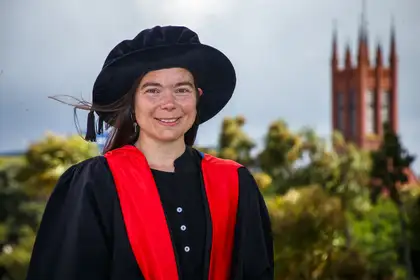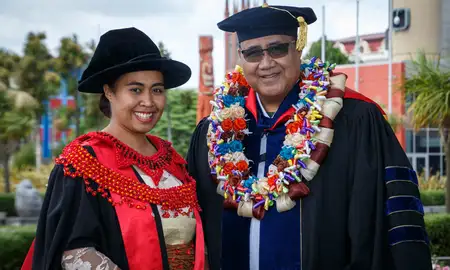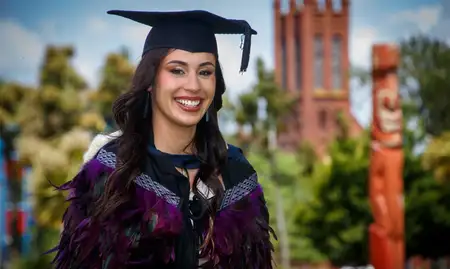
Dr Lauréline Guinnefollau.
Examining the impact of teaching-related activities on horses’ behaviour and welfare was the aim of Dr Guinnefollau’s research. She analysed the horses used at Massey to teach undergraduate equine and veterinary science students, who require hands-on experience and exposure with the animals in order to remain safe when they move into employment.
Her findings suggested that the teaching horses experienced limited physical, physiological and behavioural stress due to their use for practical teaching classes.
Dr Guinnefollau says her research could help other institutions who teach similar subjects. “Any other institution using horses for educational purposes or even animal ethics committees may use the results of this thesis. It is indeed necessary to enhance the students’ learning outcomes with increased time spent around horses, while mitigating the impact of the student-horse interaction on the horses.”
The 32-year-old says she enjoyed the student-related aspects of her research. “I really enjoyed having to evaluate what knowledge the students had of horses and of animal behaviour, and how much they were taught about these subjects and when during their studies.”
Born in Paris but raised in the French Alps, Dr Guinnefollau completed a Bachelor of Science in biology at Pierre and Marie Curie University in Paris, followed by a Master of Science (MSc) in ecology, biodiversity and evolution at Francois Rabelais University in Tours.
With the last six months of her MSc requiring her to complete an internship, and with the option of either staying in France or going overseas, Dr Guinnefollau opted to move to Australia for the internship. At the end of that, a trip to New Zealand with partner Hugo saw the duo fall in love with the country, and they decided that if the opportunity to move to New Zealand came up, they would take it. And, funnily enough, it did.
Dr Guinnefollau says that while she had always said she wasn’t really interested in doing a PhD, she heard of a specific one in New Zealand and couldn’t say no.
“It had everything I could hope for – animal welfare/behaviour, horses and New Zealand, so we decided that we would move to the other side of the world for this new chapter of our lives.”
She says her study journey with Massey was very smooth. “I had an amazing team of supervisors who really supported me and worked well together. There were no major disturbances to our plans for any of the studies, and I was able to submit my thesis in time. Despite some stressful times during some experiments, data analysis or writing, I was able to find a great balance between work and time off, and it made these years easier than they sometimes can be.”
Since completing her PhD, Dr Guinnefollau has taken time off from study, and has been working in a bulk food shop that shares her values regarding the environment and animal welfare. “I am currently not very interested in doing further study, but this is also what I used to say before starting my PhD. Therefore, I won’t exclude a postdoc, if I came across the right subject. Who know’s what’s next?”
More news
Pacific graduate follows in father’s footsteps
Witnessing her father’s dedication to his education despite many hardships inspired PhD graduate Sulueti Manu O'Uiha to do the same.

Upholding the mana of te reo: Graduate completes entire degree in Māori
For most people, completing their first degree is hard enough as it is, but Suraya Goss, Te Ātihaunui-a-Pāpārangi, took on the added challenge of completing her entire qualification in te reo Māori.
